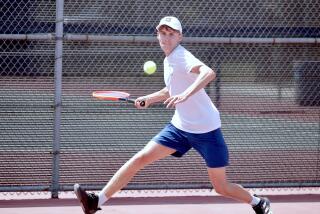IRVINE : Wheelchair Tennis’ Best Battle It Out
- Share via
Chip Parmelly got just what he wanted for his 39th birthday. The Diamond Bar man spent Wednesday playing his favorite sport with the top athletes in the world.
And winning.
“It’s a great birthday present,” said a jubilant Parmelly after a grueling two-hour tennis match, which advanced him to the quarterfinals after his victory Wednesday.
Parmelly is one of 300 athletes from 30 nations competing for $10,000 in prize money at the 15th annual U.S. Open Wheelchair Tennis Championships. The tournament--known as the Wimbledon of Wheelchair Tennis--runs until Sunday at the Irvine Racquet Club.
Fifteen years ago, there were only 75 people in the world playing wheelchair tennis. Today, their ranks have swelled to almost 12,000.
“I never thought it would get this far,” said Brad Parks, 38, president of the San Clemente-based National Foundation of Wheelchair Tennis, and founder of the tournament.
It all began when Parks suffered a snow-skiing accident in 1977. Sitting in the hospital, trying to put his life back together, he thought “What can I do in a wheelchair?”
The answer was to invent a new sport. Parks and a friend from San Clemente, Jeff Minnebraker, started out playing games in Griffith Park, laboriously pushing 50-pound wheelchairs.
But in time, there came better chairs--faster, lighter models with slanted wheels and streamlined frames. Today, top-of-the-line chairs weigh as little as 16 pounds.
One of the sport’s best attributes, Parks says, is that the able-bodied can play it with people in wheelchairs.
Watching the courts Wednesday, Randy Snow, 36, a three-time winner of the tournament, said the thrill of the game goes beyond sports.
“Everybody here had an accident or a birth defect. At some point, they were stuck somewhere suffering a great trauma, struggling to figure out who they were going to be,” said Snow, who lost the use of his legs in a 1975 farming accident. “How were they going to live? The game helped them through that time.”
The hardest part of playing wheelchair tennis, said the Texan, is dealing with able-bodied people who don’t take the game seriously.
“We’re way beyond the point where this sport was just therapy,” agreed women’s world champion, Monique Kalkman, 30.
More to Read
Go beyond the scoreboard
Get the latest on L.A.'s teams in the daily Sports Report newsletter.
You may occasionally receive promotional content from the Los Angeles Times.










